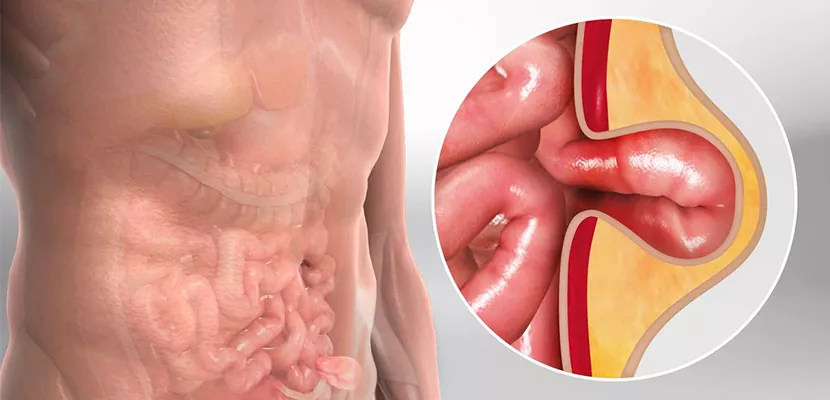A hernia is a condition of our body in which an organ or tissue emerges out of a hole in the body, such as the stomach or intestines coming out through a hole in a weak place, usually, the hernia occurs in the stomach, but it occurs in the upper part of the thigh, the navel. Or it can happen very easily in the waist, although hernia is not a dangerous disease it is also not a self-healing disease. It can happen to anyone, including children, men, and women. However, a hernia occurs when a portion of the intestine or a sac near the contents of the stomach protrudes deep into the abdominal wall. Here we will see What is a hernia? Know about the types, symptoms, causes, risks, and prevention of hernia.

What is a hernia?
In Hernia, any abdominal organ such as an intestine, tissue, or muscle starts coming out through a hole, for example- if a person has a hole in the stomach, many times the intestine comes out by piercing the weak wall of the stomach. Huh. Abdominal hernias are most common, but can also occur in the upper thigh, middle abdomen, and groin areas (the area between the abdomen and thigh). Its symptoms are usually not visible but sometimes intense pain is quite common in hernia and from this, we can identify that we have a hernia problem.
A hernia is usually not life-threatening, but it does not get better on its own. Sometimes surgery may be needed to prevent or eliminate dangerous complications from a hernia.
Types of Hernia:
1. Inguinal Hernia:
Inguinal hernia is a very common hernia, according to the British Hernia Center (BHC) report, 70% of cases of inguinal hernia are found in this Hernia if the intestine from our body starts coming out of a weak abdominal passage or part of the lower abdominal wall. So it’s called an inguinal hernia.
2. Umbilical Hernia (Umbilical Hernia):
An umbilical hernia occurs in babies up to 6 months of age when their intestines start coming out through the abdominal wall near the navel. In such a condition, you can see a bulge around the belly or navel of your baby, especially when he cries, it can be easily seen, it often gets better on its own but if it does not cure itself then surgery is recommended.
3. Pubic Hernia (Femoral– Familial Hernia):
This is a very unusual type of hernia that is found more in women, only 20% of cases are found when sometimes it appears in the inner upper part of the thighs or groin and goes back in when lying down, it is called a pubic hernia. It hurts a lot while coughing.
What are the symptoms of a Hernia?
Hernia starts in our stomach, it weakens our abdominal walls and abdominal muscles, there is a lump in the lower part of the abdomen, which ends when we get up while lying down, but while lifting something, we suddenly experience severe pain. In this disease, the patient feels trouble while standing or being stressed.
Along with this, some of the main symptoms are also given below.
- pain
- Nausea
- Vomiting
- the bulge cannot be pushed back into the abdomen
Causes and risks of hernia
Weak tissues are also included to increase the risk of hernia in our body. Along with doing more heavy, vigorous physical work out can also increase the pressure on the stomach like-
Due to obesity, there is a lot of pressure on the stomach
- heavy lifting
- persistent cough
- urinating and passing stool
- muscle strain
- fluid accumulation in the stomach
- not getting enough nutrition
Risk
- constipated for a long time.
- If you are coughing continuously
- Persistent vomiting.
- Being overweight or obese.
- Ascites (abnormal accumulation of fluids in the abdominal cavity).
- peritoneal dialysis.
- Accumulation of fat in the stomach.
- pregnancy.
- Abdominal surgery. (Incisional hernia means a hernia that causes abdominal pain, pressure, swelling, and fever; abdominal surgery increases the risk of its occurrence)
- Repeatedly lifting or moving a heavy object.
- If someone in one’s family already has a hernia, then the risk of getting a hernia increases.
- Smoking can make a chronic cough worse.
Hernia prevention
By the way, if you have an umbilical hernia, then it is a little difficult to avoid it, but other types of hernia can be cured, for its treatment, there should not be much pressure on the patient’s stomach.
- Keep weight under control.
- Constipation should not be allowed at all, for which fresh fruits and vegetables should be consumed
- Avoid straining during bowel movements and urination.
- Use proper technique when lifting weights, especially when lifting heavy objects.
- Quit smoking to avoid recurring coughs.
- If you have a persistent cough, then see a doctor and get cough treatment.
- If you are showing early signs of hernia, then get it checked by a doctor and get it treated before it grows.
Also, Read this: https://blog.subhashgoyal.in/ayurveda/drug-addiction-treatment-in-chandigarh/
Hernia Treatment:
Hernia is treated by looking at its symptoms and size, although it is an incurable disease, if its treatment is started at the right time, then there is a lot of hope for its recovery. There are lifestyle changes, medicines, surgeries, etc.
Lifestyle changes:
If the hernia is treated then it can be cured to a great extent. Along with this, you should also control your weight.
If you eat more spicy food, which makes stomach acid and causes heartburn, then you should avoid these especially, apart from this, if you smoke then avoid doing this very much it is fatal.
Some exercises are also very beneficial in hernia, which strengthen the abdominal muscles, by doing this the symptoms of Hernia can be reduced to a great extent, but while exercising, the patient should also keep in mind that he is doing it in the right position.
surgery
If the above-mentioned measures are also not giving any benefit and the pain is increasing, then the last way for the patient is to have surgery, for this should contact his doctor immediately, in this the affected area of the abdomen is stitched.
A hernia is treated with open surgery or laparoscopic surgery.




